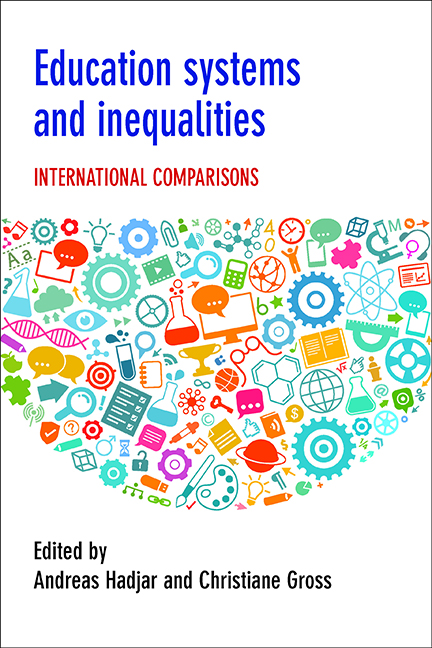Book contents
- Frontmatter
- Contents
- List of tables and figures
- Notes on contributors
- Acknowledgements
- Introduction: education systems and inequalities
- one Theorising the impact of education systems on inequalities
- two Comparing education policies in a globalising world: methodological reflections
- three Education systems and intersectionality
- four Measuring educational institutional diversity: tracking, vocational orientation and standardisation
- five Sorting and (much) more: prior ability, school effects and the impact of ability tracking on educational inequalities in achievement
- six Data analysis techniques to model the effects of education systems on educational inequalities
- seven Education systems and inequality based on social origins: the impact of school expansion and design
- eight Education systems and gender inequalities in educational attainment
- nine Tracking, school entrance requirements and the educational performance of migrant students
- ten From exclusion and segregation to inclusion? Dis/ability-based inequalities in the education systems of Germany and Nigeria
- eleven Education systems and meritocracy: social origin, educational and status attainment
- twelve Education systems and gender inequalities in educational returns
- thirteen Education systems and migrant-specific labour market returns
- fourteen Health returns on education and educational systems
- fifteen Good and bad education systems: is there an ideal?
- Conclusions and summary
- Index
seven - Education systems and inequality based on social origins: the impact of school expansion and design
Published online by Cambridge University Press: 05 April 2022
- Frontmatter
- Contents
- List of tables and figures
- Notes on contributors
- Acknowledgements
- Introduction: education systems and inequalities
- one Theorising the impact of education systems on inequalities
- two Comparing education policies in a globalising world: methodological reflections
- three Education systems and intersectionality
- four Measuring educational institutional diversity: tracking, vocational orientation and standardisation
- five Sorting and (much) more: prior ability, school effects and the impact of ability tracking on educational inequalities in achievement
- six Data analysis techniques to model the effects of education systems on educational inequalities
- seven Education systems and inequality based on social origins: the impact of school expansion and design
- eight Education systems and gender inequalities in educational attainment
- nine Tracking, school entrance requirements and the educational performance of migrant students
- ten From exclusion and segregation to inclusion? Dis/ability-based inequalities in the education systems of Germany and Nigeria
- eleven Education systems and meritocracy: social origin, educational and status attainment
- twelve Education systems and gender inequalities in educational returns
- thirteen Education systems and migrant-specific labour market returns
- fourteen Health returns on education and educational systems
- fifteen Good and bad education systems: is there an ideal?
- Conclusions and summary
- Index
Summary
Introduction
The last generation of research on social stratification has given great importance to international comparison, studying how different contexts are related to the stratification of individual outcomes (Treiman and Ganzeboom, 2000). This chapter focuses on educational achievement, and in particular on differentials in achievement based on family background, often defined as the inequality of educational opportunities (hereafter, IEO). The aim is to discuss how family-based IEO relates to the institutional context where the process of schooling takes place. While the context might include both the features of the school system and those of the wider society of which it is a part, the chapter is limited to the former, due to lack of space. This chapter contributes to the literature by focusing on two institutional features of the educational system: its expansion, that is the extent to which individuals participate in it, and its design, that is the way the process of schooling is organised. Following a ‘choice-within-constraints’ perspective (Ingram and Clay, 2000), which defines institutions as the rules that constrain the choices of actors, the chapter looks at how individual choices concerning schooling are shaped by the context in which they take place.
The chapter includes six sections. The second section presents the theoretical model of ‘choice-within-constraints’ used by most researchers to explain IEO based on family background. The third section describes the main features of school design, and the fourth presents data, variables and methods. The fifth section exposes the main results and the sixth concludes the chapter.
Educational choice and its constraints
Many theoretical models have been proposed in order to explain the aggregate patterns of IEO by family background. This chapter concentrates on micro-level theoretical models that explain the macro-patterns as the aggregate outcome of a number of individual decisions, following the perspective on the micro-macro-transition proposed by Coleman (1990), as well as the ‘choice-within-constraints’ paradigm (Ingram and Clay, 2000). While a number of empirical papers have developed such a perspective with regard to educational choices (for example, Erikson and Jonsson, 1996; Breen and Goldthorpe, 1997; Becker, 2003; Breen and Yaish, 2006; Ballarino et al, 2009), little theoretical work has been done on the matter.
- Type
- Chapter
- Information
- Education Systems and InequalitiesInternational Comparisons, pp. 135 - 158Publisher: Bristol University PressPrint publication year: 2016



